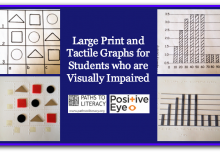Graphs and charts can be very challenging for students who are blind or visually impaired, whether they are using tactile graphs or large print graphs. Students with visual impairments must be specifically taught how to interpret tactile graphics and these...
Braille
Posted by Liamsmom
Our Liam turned 5 last week and his little brother Finn turned 2 the week before. Liam and Finn celebrated their birthdays together with family and friends by having a birthday party at our house. For those of you who don't already know, my son...
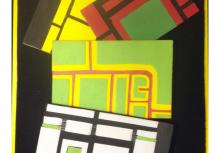
Posted by Laurie Hudson
Skills in reading/writing tactile images, or “tactile-graphicity,” develop with lots and lots of carefully sequenced, guided exposure to thoughtfully designed and well-made tactile images. It takes time, strategy, and a steady hand to...
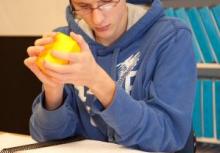
Posted by Tara Mason
There are numerous materials that will help students access the Common Core State Standards. These materials may be used to: access materials, exhibit knowledge and skills, or enhance learning activities associated with the CCSS. Presley and D’Andrea...
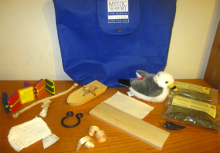
Posted by Cindy Reed-Brown
Like most TVIs, the preschool Education Consultants at CT Services for the Blind have been using “storyboxes” for many years with our students. Also, like most TVIs, we’ve tried to provide a variety of social activities for our young...
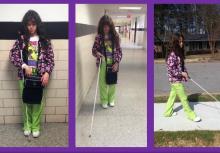
Posted by Laurie Hudson
Literacy happens throughout Orientation & Mobility curricula: maintaining personal notes of walking routes and personal O&M journals, reading public transportation routes and schedules, menus and maps, processing Global Positioning System output,...
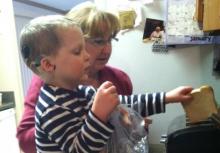
Posted by Liamsmom
My son Liam (a happy, social, deaf-blind preschooler) has an intervener/interpreter that is with him at school. Liam’s intervener and I wanted to create a conversation box that he could use at school. We came up with an experience Liam...
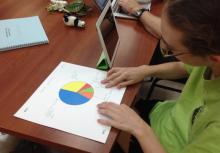
Posted by Penny Rosenblum
Dots for Families was originally designed in 2003 by L. Penny Rosenblum, Ph.D., University of Arizona, and Linda Reed, M.Ed., Arizona State Schools for the Deaf and the Blind Parent Outreach Program for the Visually Impaired for family members, teachers of...
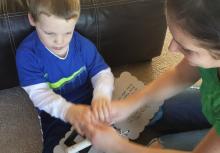
Posted by Liamsmom
My 4-year-old, deafblind son Liam goes to gymnastics every Friday; a perfect opportunity for us to have a ‘go’ at making our first experience book together.
What is an experience...
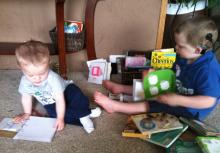
Posted by Liamsmom
Create your own books and activities for the blind or deafblind child in your life!
Liam’s story
A brief summary (very brief) of our Liam’s story: When my son was 2 ½ years old, he became sick with meningitis, the end result...
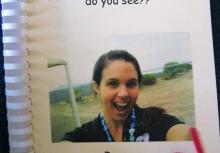
Posted by Katie Armstrong
In a strategy posted by Charlotte called Labeling the Environment in an Accessible Format, she talked about texture symbols and object symbols. Name symbols are something that I have used in my preschool classroom for years! This practice is an easy...

Posted by Charlotte Cushman
TVI Ann Edie shares ideas for how to help students to maintain braille skills during summer break.
1. Go to students' homes or whatever summer school or day camp programs they are involved in to deliver TVI services over the summer.
2. Match the...
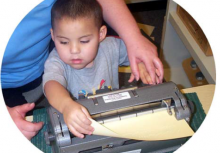
Posted by Penny Rosenblum
I am often asked for information about how to support the development of braille skills and braille literacy at home and I put together a packet for a conference a few years ago with some of my favorite resources. The packet, which can be downloaded...

Posted by Anna Swenson
By Anne Spitz, Teacher of the Visually Impaired, Dover, MA
and Anna Swenson, Braille Literacy Consultant, Fairfax, VA
The ideas in this post grew out of a workshop in Connecticut on Braille Literacy Skills and are posted in their complete...
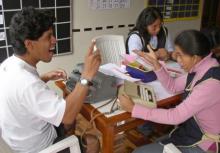
Posted by Steve Perreault
The real purpose of this activity is to create motivation about braille for teenagers who are newly blind and congenitally deaf. This approach uses language experience stories written in contracted braille to give the full sense of braille....

Posted by Anna Swenson
Fluency, one of the five areas recognized by the National Reading Panel, is a goal for all beginning readers, whether they use print or braille. We recognize fluency when children read accurately at a normal rate of speed, observe punctuation marks, and use...
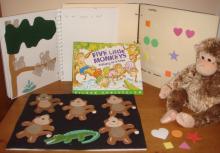
Posted by Diane Brauner
I have created a number of emerging literacy kits for TVIs to use to help young children to develop pre-braille skills. Each kit includes print/braille books with tactile pictures, real objects, activities, interactive concept alphabet book,extensive...
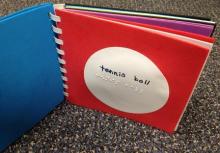
Posted by Laurie Hudson
This activity is a way to make braille fun for emergent readers!
I have a collection of about 20 balls...all different sizes and shapes and textures and weights, including a tennis ball, a fuzzy ball, a football, a spiky ball, a bumpy ball, a koosh...
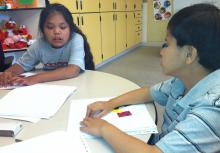
Posted by Megan Mogan
By Megan Mogan, Speech-Language Pathologist
What is "Adapted Adapted Literacy"?
Over the years, you may have noticed a shift in the population of students you serve as TVIs, Speech Therapists, Orientation and Mobility Specialists, etc. ...
Posted by Laurie Hudson
Laurie Hudson, the 2012 Braille Institute Braille Challenge Teacher of the Year, shares strategies for teaching braille to our youngest readers. She believes that young children benefit from an approach to braille that is developmental, meaningful and...

